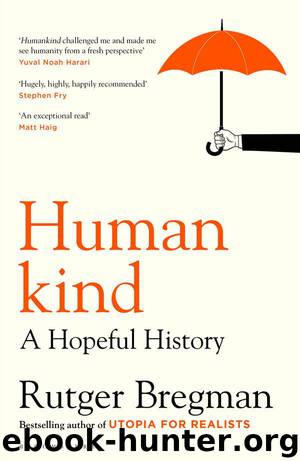Humankind by Bregman Rutger

Author:Bregman, Rutger [Bregman, Rutger]
Language: eng
Format: azw3, mobi, epub
Publisher: amazon
Published: 0101-01-01T00:00:00+00:00
3
As I read Dacher Keltner’s work and about the psychology of power, I began to see how the development of private property and farming could have led Homo puppy astray.
For millennia, we picked the nice guys to be in charge. We were well aware even in our prehistoric days that power corrupts, so we also leveraged a system of shaming and peer pressure to keep group members in check.
But 10,000 years ago it became substantially more difficult to unseat the powerful. As we settled down in cities and states and our rulers gained command over whole armies, a little gossip or a well-aimed spear were no longer enough. Kings simply didn’t allow themselves to be dethroned. Presidents were not brought down by taunts and jeers.
Some historians suspect that we’re now actually dependent on inequality. Yuval Noah Harari, for example, writes that ‘complex human societies seem to require imagined hierarchies and unjust discrimination’.34 (And you can be sure that such statements are met with grave approval at the top.)
But what fascinates me is that people around the world have continued to find ways to tame their leaders, even after the advent of chieftains and kings. One obvious method is revolution. Every revolution, whether the French (1789), the Russian (1917), or the Arab Spring (2011), is fuelled by the same dynamic. The masses try to overthrow a tyrant.
Most revolutions ultimately fail, though. No sooner is one despot brought down than a new leader stands up and develops an insatiable lust for power. After the French Revolution it was Napoleon. After the Russian Revolution it was Lenin and Stalin. Egypt, too, has reverted to yet another dictator. Sociologists call this the ‘iron law of oligarchy’: even socialists and communists, for all their vaunted ideals of liberty and equality, are far from immune to the corrupting influence of too much power.
Some societies have coped with this by engineering a system of distributed power – otherwise known as ‘democracy’. Although the word suggests it is the people who govern (in ancient Greek, demos means ‘people’ and kratos means ‘power’), it doesn’t usually work out that way.
Rousseau already observed that this form of government is more accurately an ‘elective aristocracy’ because in practice the people are not in power at all. Instead we’re allowed to decide who holds power over us. It’s also important to realise this model was originally designed to exclude society’s rank and file. Take the American Constitution: historians agree it ‘was intrinsically an aristocratic document designed to check the democratic tendencies of the period’.35 It was never the American Founding Fathers’ intention for the general populace to play an active role in politics. Even now, though any citizen can run for public office, it’s tough to win an election without access to an aristocratic network of donors and lobbyists. It’s not surprising that American ‘democracy’ exhibits dynastic tendencies – think of the Kennedys, the Clintons, the Bushes.
Time and again we hope for better leaders, but all too often those hopes are dashed.
Download
This site does not store any files on its server. We only index and link to content provided by other sites. Please contact the content providers to delete copyright contents if any and email us, we'll remove relevant links or contents immediately.
Rewire Your Anxious Brain by Catherine M. Pittman(18648)
Talking to Strangers by Malcolm Gladwell(13357)
The Art of Thinking Clearly by Rolf Dobelli(10468)
Mindhunter: Inside the FBI's Elite Serial Crime Unit by John E. Douglas & Mark Olshaker(9331)
Becoming Supernatural by Dr. Joe Dispenza(8209)
Change Your Questions, Change Your Life by Marilee Adams(7769)
Nudge - Improving Decisions about Health, Wealth, and Happiness by Thaler Sunstein(7697)
The Road Less Traveled by M. Scott Peck(7599)
The Lost Art of Listening by Michael P. Nichols(7500)
Mastermind: How to Think Like Sherlock Holmes by Maria Konnikova(7331)
Enlightenment Now: The Case for Reason, Science, Humanism, and Progress by Steven Pinker(7309)
Win Bigly by Scott Adams(7187)
The Way of Zen by Alan W. Watts(6608)
Daring Greatly by Brene Brown(6507)
Big Magic: Creative Living Beyond Fear by Elizabeth Gilbert(5768)
Grit by Angela Duckworth(5612)
Ego Is the Enemy by Ryan Holiday(5425)
Men In Love by Nancy Friday(5237)
The Laws of Human Nature by Robert Greene(5193)
